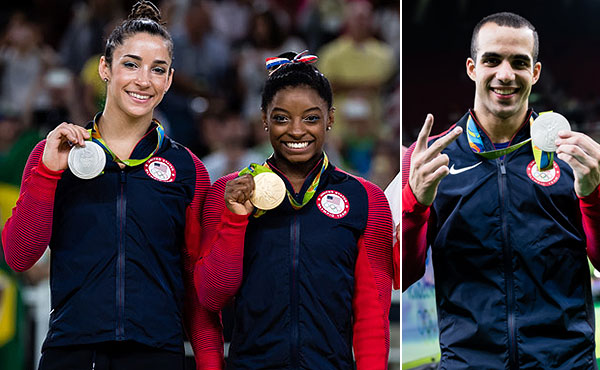
- Men’s Results: Parallel Bars | High Bar
- Women’s Results: Floor Exercise
- Photo Gallery
By Jo-Ann Barnas, Special Contributor
RIO DE JANEIRO — Simone Biles and Aly Raisman were side-by-side, just as they were minutes before when they stood on the podium with gold and silver medals around their necks, their reward for closing out the 2016 Olympic women’s gymnastics competition as the top two scorers in the floor exercise final.
“Aly!” Biles said, calling out to Raisman who was 20 feet ahead of her in the media mixed zone at the Rio Olympic Arena. “Sam is on high bar! He’s already started!”
Raisman raced down and joined her teammate in front of a television, Biles bobbing and swaying to U.S. Olympic men’s gymnast’s Sam Mikulak’s routine. A short time later, Biles and Raisman would repeat the scene when Danell Leyva competed his routine on high bar, ending with his second silver medal of the day after finishing runner up on parallel bars.
What a grand finale.
“I think we put the cherry on top, me and Aly finishing floor as well as we did,” Biles, 19, said with a giggle.
The U.S. Olympic men’s and women’s gymnastics teams went into Tuesday’s third and last day of event finals with eight total medals — seven for the women, one for the men. By the time the tiered podium was carted off the floor one last time Tuesday, they had added four more to their total for 12 — the most ever for Team USA in gymnastics at an unboycotted Olympic Games.
There was much to celebrate – even for Mikulak. Although he didn’t win an individual medal, the four-time national all-around champion and two-time Olympian walked away proud of his fourth-place performance on high bar two days after finishing eighth with a sub-par routine on floor exercise after being the top qualifier.
As for Biles and Raisman, their romp through Rio couldn’t have gone any better, the ending just as sweet as the beginning as they were able to repeat what they had done more than a week earlier when they finished 1-2 in team qualifying on floor exercise. But this time, though, they scored higher on floor in the final — 15.966 for Biles and 15.500 for Raisman. Amy Tinkler of Great Britain earned the bronze.
“It was really special, and I did the best floor routine I could have possibly done,” Raisman said. “I hadn’t gotten a 15.5 since I’ve been here, so it was really awesome. It was a great way to finish. I know Martha (Karolyi) was really happy. She said we were the “final two.” We were glad to go out with a bang.”
Biles and Raisman’s floor medals gave the U.S. women’s team a total of nine in Rio, surpassing the eight the team won at the 2008 Beijing Games. It’s the most by any women’s team since the Soviet Union claimed 10 medals at the 1972 Olympics in Munich. For Biles, her floor exercise gold was her fourth of the Olympics; putting her on a short list of women who have accomplished the feat: Larissa Latynina (1956), Vera Caslavska (1968) and Ekaterina Szabo (1984).
“Yes. There is some sense of relief,” Biles said after her dynamic and sassy floor exercise to a Brazilian medley. “I’m excited that it’s over, but I’m kind of sad, too.”
Raisman said she felt the same way, adding that she hasn’t ruled out competing at the 2020 Rio Olympics, when she’ll be 26.
“I said (before) that I get better with age, so maybe I will,” Raisman said with a laugh. “I love gymnastics. I really enjoyed competing and I surpassed my expectations and everyone else’s, so I’m definitely on a high right now. We’ll see how it goes.”
As for if we’ll see Biles in 2020, the gymnast isn’t making any commitments just yet.
“First, we’re going to have some fun, and I don’t want to think about it yet,” she said. “I need to have a bit of a break and try to be normal once we get home.”
In addition to contributing to the Final Five’s gold-medal winning performance in the team final, Biles collected individual golds in the all-around, vault and floor, and won bronze on balance beam.
Raisman, who won three medals at the 2012 London Olympics, finished with three total medals in Rio (team gold, and silver in the all-around and floor exercise). Her six career Olympic medals are second only to Shannon Miller for a U.S. woman.
To be sure, Biles’ floor gold wasn’t redemption for her performance in Monday’s beam final when the reigning world champion nearly slipped off and won bronze.
“I always told her that other people’s expectations are not your responsibility,” said Aimee Boorman, Biles’ longtime personal coach. “The whole thing with the bronze medal yesterday, she was very proud. She won the bronze medal on beam at the Olympics. How many people get to do that?”
Raisman agreed.
“I think everyone was being a little dramatic about the bronze yesterday because it’s something she (Biles) should be very proud of,” she said. “I got bronze in 2012, and it’s one of my proudest moments because its beam and its really hard.
“Simone is so amazing because I’ve had a few days since the all-around final to rest, and I was tired in between those days. For her, she didn’t get any rest. She competed on vault, beam and floor – it just shows how amazing she is and how mentally tough she is.”
Leyva’s journey just to get to Rio — from Olympic alternate to winning two silvers — has been no less impressive.
Once again, the gymnast will leave the Games as the U.S. Olympic team’s most decorated male gymnast. He was the only American man to win a medal – a bronze – in the individual all-around at the London Olympics. He has also won three world championship medals in the last two years – a team bronze and parallel bars silver in 2014, and horizontal bar silver in 2015. His resume also includes winning the 2011 world parallel bars title.
But a dismal performance at the P&G Championships in early June – the first of two Olympic qualification events – called into question his Olympic preparedness after being bit by his family’s bulldogs while trying to break up a dog fight, he was still recovering from his injuries when he finished 16th in the all-around.
By the time he reached the Olympic trials in St. Louis, he looked stronger the second day than the first, and finished third over the two nights of competition, completing all six events on both days without a major mistake. But the Olympics selection committee was looking at combined results from both P&G’s and trials, which left him in 10th place.
After not being named to the five-member squad, he was selected as an alternate along with Akash Modi and Donnell Whittenburg.
Two weeks later, John Orozco injured his left knee on a horizontal bar dismount during the men’s Olympic team training camp in mid-July, tearing his ACL and meniscus. That’s how Leyva made it to Rio.
Just over a week ago, as a team, the U.S. men looked strong at the start — finishing second in team qualifying. But just as in London, they followed a great performance with a slow start to the team finals and took fifth. Leyva had a major error that day on the high bar when he slipped off the bar.
Until Tuesday, the U.S. men’s team had just one medal in the standings — bronze by Naddour on the pommel horse.
Leyva changed that.
With parallel bars the first rotation, followed by women’s floor exercise and then high bar, Leyva had the distinction of opening and closing the day’s competition: He was first up on parallel bars, and the last gymnast to compete on high bar.
Leyva was in a zone from the start, powering through his parallel bars routine, down to his stuck dismount.
When he posted his score – a 15.900– he became not only the leader in the clubhouse, but the high mark seemed to put pressure on the gymnasts that followed, a final that included the defending world champ You Hao of China, who fell during his performance and placed eighth.
“I immediately told myself that I wasn’t letting myself get too relaxed because I had one more event,” Leyva said. “But it was a little stressful waiting for all the scores.”
When his score was topped by Oleg Verniaiev of Ukraine’s 16.166, Leyva hugged the winner.
On high bar, as the eighth and last competitor, Leyva again delivered and stayed composed through the anxious moments of waiting until his silver-medal winning score of 15.500 was posted.
Fabian Hambuechen of Germany took the gold (15.766) while Great Britain’s Nile Wilson won bronze (15.466).
“It couldn’t have been more perfect,” Leyva said. “It’s kind of an honor to know that my routine was the one that closed out the Olympics, and I did it with a routine like that. I’m incredibly happy. I couldn’t have asked for more.”




